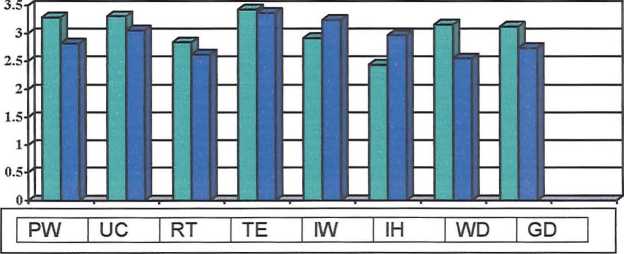135
Table 4.3.6: Comparison between 5th and 8th graders: enjoyment (2)
|
5,h graders ________ __________ |
8ltl graders____________________________ | ||||||
|
N______ |
Mean |
SD |
N |
Mean |
SD | ||
|
Individual Work______ |
t= 7.317, df≡3633, Sig.<.01 |
1479 |
2.92 |
1.32 |
2156 |
3.24 |
1.26 |
|
Individual Help_________ |
t= 12.154, df=3626, Sig. <.01 |
1472 |
-∑44 |
T23 |
2156 |
~∑97 |
~T32 |
Figure 4.3.6: Comparison between 5th and 8th graders: enjoyment

□ 5th graders
□ 8th graders
PW = Practical work, UC = Using a ∞mputer, RT= Reading a textbook, TE = Teacher explanation,
IW = Individual work. IH = Individual help, WD = Whole-class discussion. GD = Grouo discussion
Motivation
The results of Independent t-tests detailed in Table 4.3.7 and Figure 4.3.7 show that 5th
graders were more likely to perceive that Practical work, Using a computer, Reading a
textbook, Whole-class discussion and Group discussion promoted motivation than 8th
graders.
Table 4.3.7: Comparison between 5th and 8th graders: motivation (1)
|
5th graders_____________________ |
8th graders_______________________ | ||||||
|
N |
Mean |
SD |
N |
Mean |
SD | ||
|
Practical Work_______ |
t=13.671, df=3626, Sig. =<.01 |
1479 |
3.26 |
1.34 |
2149 |
2.66 |
1.29 |
|
Using a |
t=8.824, df=3020.635, Sig.<.01 |
1476 |
3.33 |
T50 |
2147 |
^^∑90 |
^T39 |
|
Reading a |
t=7.614, df≡2995.652, Sig. <.01 |
1476 |
“277 |
~T28 |
2142 |
-245 |
ТЇ7 |
|
Whole-class |
t=16.250, df≡3626, Sig. <.01 |
1479 |
Тїз |
^T24 |
2149 |
“247 |
ТЇ9 |
|
Group Discussion |
t=10.344, df=3239.884, Sig. <.01 |
1479 |
^^342 |
^T24 |
2148 |
~∑68 |
^L28 |
135
More intriguing information
1. The name is absent2. El Mercosur y la integración económica global
3. The name is absent
4. The name is absent
5. Nietzsche, immortality, singularity and eternal recurrence1
6. Dementia Care Mapping and Patient-Centred Care in Australian residential homes: An economic evaluation of the CARE Study, CHERE Working Paper 2008/4
7. Økonomisk teorihistorie - Overflødig information eller brugbar ballast?
8. Design and investigation of scalable multicast recursive protocols for wired and wireless ad hoc networks
9. CHANGING PRICES, CHANGING CIGARETTE CONSUMPTION
10. Passing the burden: corporate tax incidence in open economies